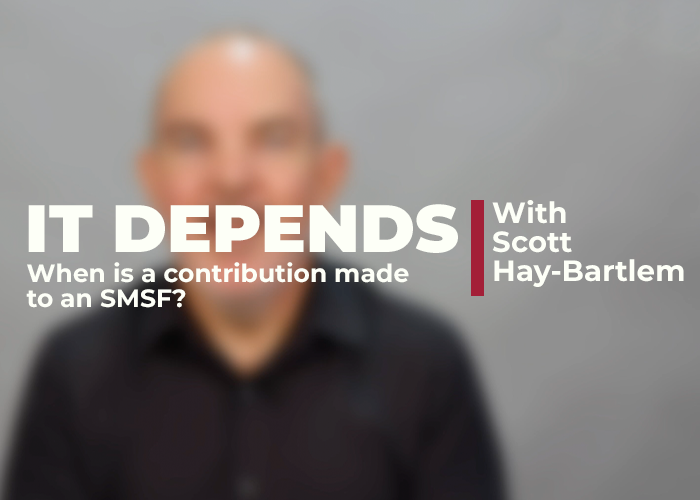In this edition of ‘It depends’, partner Scott Hay-Bartlem talks about the timing of SMSF contributions and why it matters.
VIDEO TRANSCRIPT
Welcome to It depends. Today I’m going to talk about when a contribution is made to an SMSF.
Why is this important?
The timing of a contribution can be very important as it can change when and whether it’s deductible to the person making it, often the member, how and when it’s assessable to the SMSF and even whether the contribution can be accepted by the SMSF at all. For example, a contribution made in June, which is actually not technically made until July, can result in the contribution occurring in a different year.
When is a contribution made?
So, when is a contribution made? Well, this is the ‘it depends’. For some it’s really obvious. For others there are some traps. So, where my contribution is in cash, it’s when the super fund receives the cash. If we have a contribution by electronic fund transfer, it’s when the funds get into the SMSF bank account and that’s where it’s very important to watch our timing, particularly around the end of the financial year because there can be bank delays. If we have a contribution being paid by cheque it’s when the SMSF receives the cheque, provided that it is banked promptly and is then cleared when it gets into SMSF bank account. If we’re transferring assets, then the contribution occurs when the SMSF gets ownership. Now if we have to register documents, for example, land, then when the SMSF has everything that it needs to get registered, we can consider the contribution to have been made. So, for real estate, that’s a signed stamp transfer and anything else that we need to get that transfer registered. Back in the old days, for example, certificate of title, if necessary. Again, you’ve got to make sure you get all these things lined up to get your contribution made at the time you intend.
If you’ve got any questions about timing of contributions or contributions generally, please contact a member of our SMSF team.





